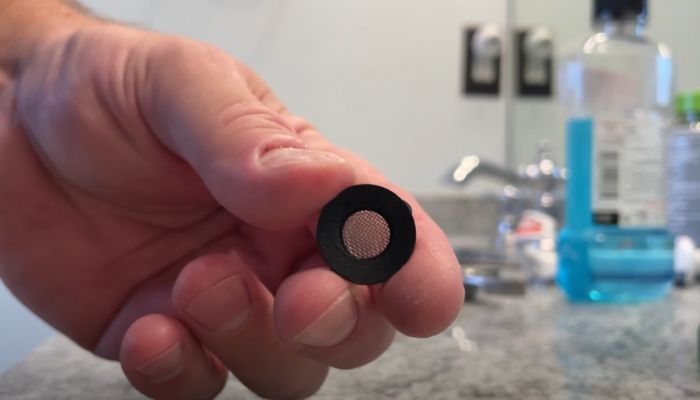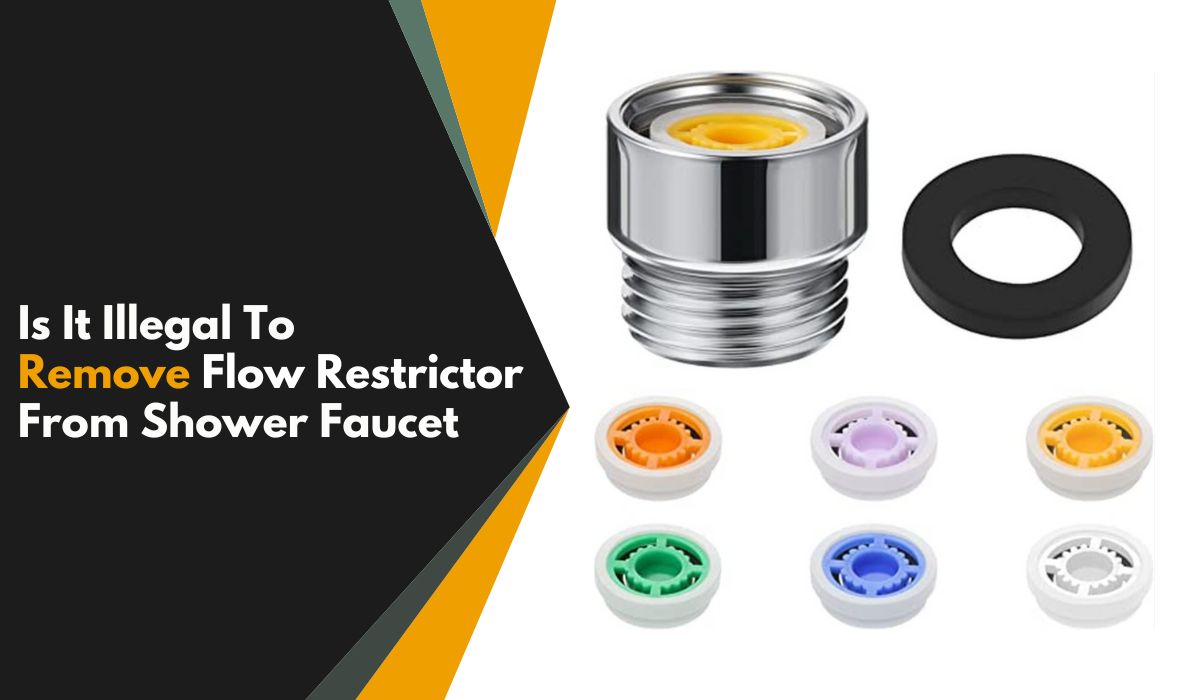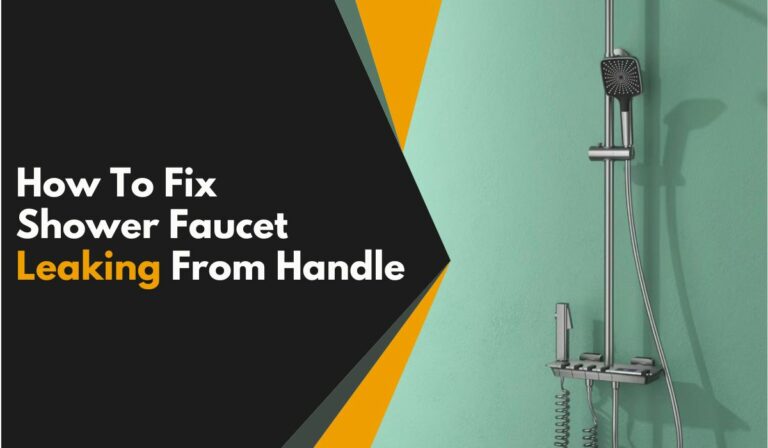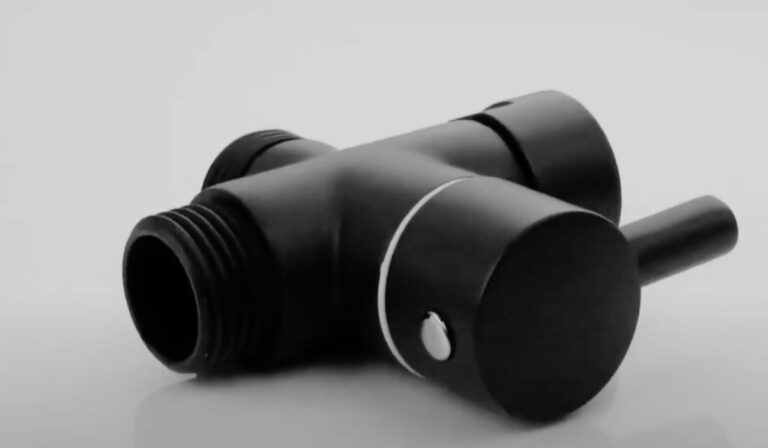Is It Illegal To Remove Flow Restrictor From Shower Faucet?
If this is your first time replacing your old showerhead with a new one, you will notice a slight change in the water pressure. It is the flow restrictor that limits the water flow.
Some love that soft shower, while others may wish to return to that heavy flow. But is it illegal to remove flow restrictor from shower faucet now?
It may not be illegal to discard that flow restrictor in some locations. However, it can become a violation if it is against the building safety regulations and codes. You should check with the landlord or a professional before handling it yourself.
Let me tell you more about the subject.
What Is a Flow Restrictor, and How Does It Work?
This thing did not even exist a few decades ago. However, the government noticed a significant waste of water despite the conservation methods by the citizens.

This heavy flow often amounted to hefty water bills, leaving many homeowners stumped.
Now, what is a flow restrictor in a showerhead? Since most water splurging takes place during our shower moments, the manufacturers mass-produced new shower faucet designs with a flow restrictor inside according to the new federal law.
Its mere job is to reduce the water flow to the newly allotted code standard.
How It Works
The flow restrictor is a small device installed in new showerheads to decrease water flow. It generally comprises a small screen or a disc with filter holes.
And water flows through the showerhead when you turn on the shower faucet handle, followed by the flow restrictor.
This obstruction limits the water volume, delivering no more than 2.5 gallons per minute or GPM.
It creates resistance in the flow, slowing down the flow rate. As a result, it conserves water and energy while maintaining sufficient pressure.
Is It Illegal to Remove Flow Restrictor?
The answer to legality can vary in different contexts. For example, it may be against the law to tamper with restrictors in some areas or a building.
These regulations are placed to promote water conservation and appropriate compliance with building codes.
On the other hand, other neighborhoods may not have such regulations. The homeowner can remove the restrictor if the flow rate is comparatively low.
Nevertheless, keep in mind the possible increase in utility bills after removing them.
So, are high-flow shower heads illegal? It depends on the local regulations and how strictly they are imposed. There may not even be any rules in your area on the matter, giving you the upper hand in readjusting your bathroom’s water flow rate.
But I recommend asking a professional before breaking any potential law and facing imminent fines.
Exploring 2.5 GPM Flow Rate Shower Heads
2.5 GPM (gallons per minute) refers to the optimal water flow rate that a shower head can deliver while staying within the law.
Here is what you need to know about them:
Why Do Some People Want to Remove Flow Restrictor?
Here are some reasons why some people find flow restrictors a nuisance —you may even find yours on the list!
Can Removing Flow Restrictors Cause Any Issues?
Suppose your Glacier Bay shower faucet has low water pressure. It is a quality product that hardly encounters criticism.

However, your house is in a location where the water flow rate is ridiculously low. And the shower head does nothing close to easing your stressful day.
Should you live in this state for the rest of your life or bring about a change?
In this kind of situation, removing the flow restrictors at home is justifiable because it is helping nobody!
However, you must accept the likelihood of consequences afterward, such as:
Alternatives to Removing Flow Restrictors
What if I told you there are other ways to stick within the law and achieve that desired flow still?
Exploring Alternative Methods to Enhance the Shower Experience
The following options are intended to provide an enhanced shower experience without taking out the flow restrictor:
- Replace the current shower head with a specifically designed high-pressure one that mimics stronger water flow while keeping a minimal flow rate.
- Go for shower heads with various spray settings to create an invigorating shower experience.
- Inspect and fix a shower head that does not work before blaming the restrictor.
- You can also utilize a shower head filter to remove impurities and experience soft water cascading, which delivers a more luxurious experience.
- Obtain shower heads that offer adjustable flow restrictors for personalized customization.
- You may even look into shower head extensions to gain an immersive shower experience. It will also allow you to adjust the angle and height of the water flow.
Water-efficient Showerheads and Their Benefits
Mainly, you can save abundant water while minimizing your bill payments (decreased energy usage for water heating). The 1.5 or 1.7 GPM rate ensures satisfactory pressure and a comfortable shower moment.
Plus, you will be contributing to environmental sustainability and promoting eco-friendly habits.
Pros and Cons of Removing Flow Restrictors From Shower Head
The pros of removing flow restrictors are:
- Stronger water pressure.
- Increased water flow.
- Personalized shower experience.
- Beneficial to individuals with therapeutic needs.
- It is an improvement perceived in shower satisfaction.
The cons of removing flow restrictors are:
- Higher utility bills.
- Increased water consumption.
- The overall strain on the environment and water resources.
- This may lead to premature damage to plumbing fixtures.
- It may also be a violation of building codes or local regulations.
- The individual may be charged with fines or penalties.
What Are the Benefits of Flow Restrictors?
If you are almost at the precipice of getting that wrench to remove water restrictor from shower head, think again. Go through this list of benefits before taking action.
Final Word
So, is it illegal to remove flow restrictor from shower faucet? Since it offers a technical explanation, I suggest reading this guide to enlighten you with the right information.
You can remove the restrictor to some extent, but it is better to hear it from a professional first.
On the contrary, some remove it without even consulting a supervisor who specializes in house/building codes and regulations. Try not to follow that example.
Lastly, I hope this article opens a new door for you to understand what steps to take. Good luck!


![Water Still Flowing From Faucet While Using Shower [Solved]](https://faucetfam.com/wp-content/uploads/2023/06/Water-Still-Flowing-From-Faucet-While-Using-Shower-768x448.jpg)

![Water Drips When Shower Is Off and Diverter Is Engaged [Solved]](https://faucetfam.com/wp-content/uploads/2023/06/Water-Drips-When-Shower-Is-Off-and-Diverter-Is-Engaged-768x448.jpeg)


![Single Handle Shower Faucet Is Hard to Turn Off [Solved]](https://faucetfam.com/wp-content/uploads/2023/06/Single-Handle-Shower-Faucet-Is-Hard-to-Turn-Off-768x448.jpg)